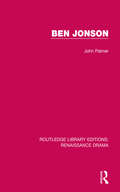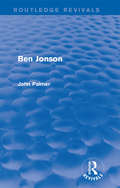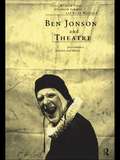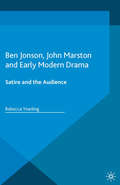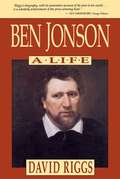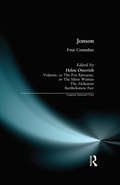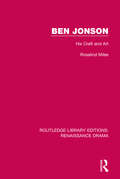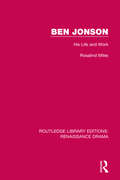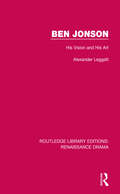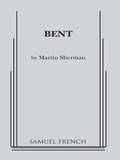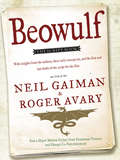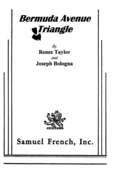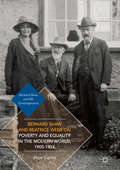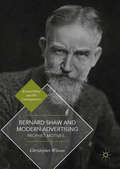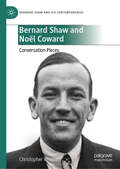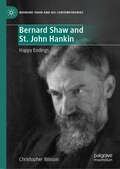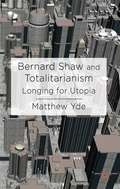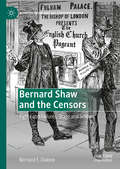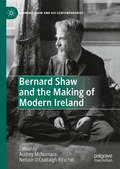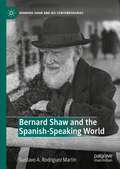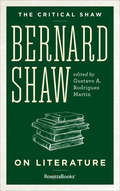- Table View
- List View
Ben Jonson (Routledge Library Editions: Renaissance Drama)
by John PalmerWhile most critical writing on Jonson concentrates on the plays, poems or masques seen in isolation, this title, first published in 1981, ranges across the genres to explore Jonson’s vision as a whole. The author points to the inner connections that make of the rich variety of Jonson’s writing a single coherent body of work. We see Jonson exploring the relations between culture and society, the difficulties of ideal virtue in a far from ideal world, and above all the problems of art itself. Combining a wide-ranging discussion of Jonson’s interests with a detailed examination of his major works, this book provides a balanced critical introduction to one of the most complex and fascinating figures in English Literature.
Ben Jonson (Routledge Revivals)
by John PalmerOriginally published in 1934, Palmer’s biography of famous playwright Ben Jonson delves into his life and works and what he achieved in both. As first poet laureate of England, Jonson’s life presents a fascinating look into the state of literature and theatre in renaissance Britain which Palmer presents in great detail. This title will be of interest to students of literature.
Ben Jonson and Theatre: Performance, Practice and Theory
by Brian Woolland Richard Cave Elizabeth SchaferBen Jonson and Theatre is an investigation and celebration of Jonson's plays from the point of view of the theatre practitioner as well as the teacher. Reflecting the increasing interest in the wider field of Renaissance drama, this book bridges the theory/practice divide by debating how Jonson's drama operates in performance. Ben Jonson and Theatre includes: * discussions with and between practitioners * essays on the staging of the plays * edited transcripts of interviews with contemporary practitioners The volume includes contributions from Joan Littlewood, Sam Mendes, John Nettles, Simon Russell Beale and Geoffrey Rush, Oscar-winning actor for Shine.
Ben Jonson and the Art of Secrecy
by William W. SlightsSecrets accomplish their cultural work by distinguishing the knowable from the (at least temporarily) unknowable, those who know from those who don't. Within these distinctions resides an enormous power that Ben Jonson (1572-1637) both deplored and exploited in his art of making plays.Conspiracies and intrigues are the driving force of Jonson's dramatic universe. Focusing on Sejanus, His Fall; Volpone, or the Fox; Epicoene, or the Silent Woman; The Alchemist; Catiline, His Conspiracy, and Bartholomew Fair, William Slights places Jonson within the context of the secrecy- ridden culture of the court of King James I and provides illuminating readings of his best-known plays.Slights draws on the sociology of secrecy, the history of censorship, and the theory of hermeneutics to investigate secrecy, intrigue, and conspiracy as aspects of Jonsonian dramatic form, contemporary court/city/church politics, and textual interpretation. He argues that the tension between concealment and revelation in the plays affords a model for the poise that sustained Jonson in the intricately linked worlds of royal court and commercial theatre and that made him a pivotal figure in the cultural history of early modern England.Equally rejecting the position that Jonson was a renegade subverter of the arcana imperii and that he was a thorough-going court apologist, Slights finds that the playwright redraws the lines between private and public discourse for his own and subsequent ages.
Ben Jonson, John Marston and Early Modern Drama: Satire and the Audience
by Rebecca YearlingThis book examines the influence of John Marston, typically seen as a minor figure among early modern dramatists, on his colleague Ben Jonson. While Marston is usually famed more for his very public rivalry with Jonson than for the quality of his plays, this book argues that such a view of Marston seriously underestimates his importance to the theatre of his time. In it, the author contends that Marston's plays represent an experiment in a new kind of satiric drama, with origins in the humanist tradition of serio ludere. His works—deliberately unpredictable, inconsistent and metatheatrical—subvert theatrical conventions and provide confusingly multiple perspectives on the action, forcing their spectators to engage actively with the drama and the moral dilemmas that it presents. The book argues that Marston's work thus anticipates and perhaps influenced the mid-period work of Ben Jonson, in plays such as Sejanus, Volpone and The Alchemist.
Ben Jonson: A Life
by David RiggsBen Jonson’s contemporaries admired him above all other playwrights and poets of the English Renaissance. He was the “great refiner” who alchemized the bleakest aspects of everyday life into brilliant images of folly and deceit. He was also a celebrated reprobate and an ambitious entrepreneur. David Riggs illuminates every facet of this extraordinary career, giving us the first major biography of Jonson in over sixty years. The story of Jonson’s life provides a broad view of the literary procession in early modern England and the milieu in which Elizabethan drama was produced. Beginning as a journeyman actor, Jonson was soon a novice playwright; his first important play was staged in 1598, with Shakespeare in the cast. He was by turns the self-styled leader of a literary elite, a writer of court masques, the first dramatist to publish his own Works, a royal pensioner, and a genteel poet. As Jonson transformed himself from an artisan into a gentleman, his need to transcend his class origins led him to murder, to his notorious quarrels with Thomas Dekker, John Marston, and Inigo Jones, and to his lifelong rivalry with Shakespeare. Riggs traces the roots of Jonson’s aggressiveness back to the turmoil of his childhood and adolescence. He offers new and convincing accounts of Jonson’s latent hostility toward his bricklayer stepfather, his reckless marriage to Anne Lewis, and his conflicted relationships with his children. This vivid portrait synthesizes six decades of scholarship and new historical evidence. Sixty halftones beautifully illustrate the story and capture the spirit of the age. With Riggs’ original interpretations of Jonson’s masterpieces and lesser known works, Ben Jonson: A Life will prove the standard account of this complex man’s life and works for many years to come.
Ben Jonson: Four Comedies (Longman Annotated Texts)
by Ben Johnson Helen OstovichThis edition of Ben Jonson's four middle comedies places the works in the popular history and culture of the times, 1605-1614, and surveys the influences, both classical and contemporary, on Jonson as a playwright. On-the-page annotations recreate the audiences perception of the plays as performances by commenting on the stage-directions, the self-conscious theatricality of characters and scenes, and the vivid colloquialisms of early modern London that give the dialogue a heightened dimension of realism. Brief introductions to each play discuss the local settings, sources, theatre history and further readings. The general introduction includes a biography of Jonson, a chronology of the plays and masques, and separate essays on each play, dealing particularly with Jonson's satirical treatments of trends and shams of the day, whether political, social, commercial, or spiritual.
Ben Jonson: His Craft and Art (Routledge Library Editions: Renaissance Drama)
by Rosalind MilesThough he is one of the undisputed giants of English literature, Ben Jonson is known to most people only as the author of one or two masterly plays which regularly appear in the drama repertory. He is much less well-known for his whole oeuvre, which encompasses poetry, criticism, masque-making, and a lifetime of linguistic and lexicographical study. In this book, first published in 1990, the author presents a comprehensive critical study of the whole of Jonson’s output from his earliest beginnings through to the final achievement. Looking at every word he ever wrote, in drama, masque, poetry, philosophy and literary criticism, the author reveals an interesting and varied picture of Jonson. This title will be of interest to students of English literature and Renaissance drama.
Ben Jonson: His Life and Work (Routledge Library Editions: Renaissance Drama)
by Rosalind MilesThe extraordinary character of Ben Jonson has only recently been brought into the light. Critics traditionally exalted Shakespeare, at Jonson’s expense. In this biography, first published in 1986, the author presents a full and accurate account of Jonson’s life in modern times. Rosalind Miles follows Jonson from his obscure beginnings to his burial in Westminster Abbey, as the first Poet Laureate, in 1637. Her Jonson is vivid and vigorous, equally alive in his life and in his work. This title will be of interest to students of history, English literature and Renaissance drama.
Ben Jonson: His Vision and His Art (Routledge Library Editions: Renaissance Drama)
by Alexander LeggattWhile most critical writing on Jonson concentrates on the plays, poems or masques seen in isolation, this title, first published in 1981, ranges across the genres to explore Jonson’s vision as a whole. The author points to the inner connections that make of the rich variety of Jonson’s writing a single coherent body of work. We see Jonson exploring the relations between culture and society, the difficulties of ideal virtue in a far from ideal world, and above all the problems of art itself. Combining a wide-ranging discussion of Jonson’s interests with a detailed examination of his major works, this book provides a balanced critical introduction to one of the most complex and fascinating figures in English Literature.
Bennewitz, Goethe, 'Faust'
by David G. JohnFritz Bennewitz (1926-1995) was the director-in-chief of East Germany's Weimar National Theatre. Extraordinary in his capacity for cultural and linguistic adjustment, he directed productions in twelve countries, always adapting shows to make them meaningful to local audiences. Notably, Bennewitz conducted stagings of Goethe's Faust in four different languages over a series of seven productions -- three in pre-unification Weimar, one in the reunited Germany, and one each in New York, Manila, and Mumbai.The first comprehensive account of Bennewitz's remarkable career, Bennewitz, Goethe, Faust is also a pioneering study of intercultural interpretations of Faust. David G. John brings to light previously unknown archival materials -- including annotated playbooks, correspondence, translations, videos, and reception information -- as well as unpublished production photos from the stagings discussed in the book. Bennewitz, Goethe, Faust makes a cogent argument for this director's place alongside the twentieth century's greatest theatre innovators.
Bent
by Martin ShermanDrama / 11m / Simple sets / In 1934 Berlin on the eve of the Nazi incursion, Max, a grifter and his lover Rudy are recovering from a night of debauchery with a SA trooper. Two soldiers burst into the apartment and slit their guest's throat, beginning a nightmare odyssey through Nazi Germany. Ranked lower on the human scale than Jews, the men as awoved homosexuals, flee. Desperate and on the run, Max asks his own "discreetly" homosexual Uncle Freddie for help as the older man offers little more than suggestions on how to live, as he does, practicing homosexuality on the side. Attempting their escape, Rudy is beaten to death as Horst, another homosexual prisoner, warns Max to deny his lover. Taken to a death camp at Dachau, Max and Horst branded with the "pink triangle", hope to survive with each other for comfort and courage but it is not to be. Richard Gere created the role of Max on Broadway. / "Powerful and provocative."-The New York Times
Bent: The Play (Applause Books)
by Martin Sherman(Applause Books). Martin Sherman's worldwide hit play Bent took London by storm in 1979 when it was first performed by the Royal Court Theatre, with Ian McKellen as Max (a character written with the actor in mind). The play itself caused an uproar. <p><p>"It educated the world," Sherman explains. "People knew about how the Third Reich treated Jews and, to some extent, gypsies and political prisoners. But very little had come out about their treatment of homosexuals." Gays were arrested and interned at work camps prior to the genocide of Jews, gypsies, and handicapped, and continued to be imprisoned even after the fall of the Third Reich and liberation of the camps. The play Bent highlights the reason why: a largely ignored German law, Paragraph 175, making homosexuality a criminal offense, which Hitler reactivated and strengthened during his rise to power.
Beowulf
by Neil Gaiman Roger AvaryWho will come to the aid of beleaguered King Hrothgar, whose warriors have become the prey of the vengeful outcast monster Grendel?In the able hands of #1 New York Times bestselling author Neil Gaiman (Anansi Boys, American Gods) and Academy Award-winning screenwriter Roger Avary (Pulp Fiction, Silent Hill), a timeless classic adventure takes on a astonishing new life. Here are the initial draft and final shooting script of the star-studded blockbuster film from Paramount Pictures and Academy Award-winning director Robert Zemeckis (Forest Gump, Back to the Future), plus concept art, fascinating insights in the screenplay's evolution, an introduction by Avary, an afterword from Gaiman...AND MUCH, MUCH MORE!
Bermuda Ave. Triangle
by Renee Taylor Joseph Bologna2m, 4f / This outrageous comedy by the authors of Lovers and Other Strangers and other uproarious hits starred Nanette Fabray and the authors on Broadway. It concerns the adventures of a Jewish widow and an Irish widow whose successful daughters move them to Las Vegas, where they share a retirement village condo. On an excursion, they are saved from a mugger by a charming if not quite sober gambler who is short on cash. They allow him to curl up on the living room floor and he manages to sweet talk his way into both ladies' beds. Each situation is rife with the outrageous, excessive comedy that endears these playwrights to audiences everywhere. "Bologna and Taylor possess a lively and friendly sense of the ridiculous and they have a natty way with sight gags." N.Y. Post.. FEE: $75 per performance.
Bernard Shaw Candida
by Dr Raghukul TilakThe central characters are clergyman James Morell, his wife Candida and a youthful poet, Eugene Marchbanks, who tries to win Candida's affections.
Bernard Shaw and Beatrice Webb on Poverty and Equality in the Modern World, 1905–1914 (Bernard Shaw and His Contemporaries)
by Peter GahanThis book investigates how, alongside Beatrice Webb's ground-breaking pre- World War One anti-poverty campaigns, George Bernard Shaw helped launch the public debate about the relationship between equality and democracy in a developed economy. The ten years following his great 1905 play on poverty Major Barbara present a puzzle to Shaw scholars, who have hitherto failed to appreciate both the centrality of the idea of equality in major plays like Getting Married, Misalliance, and Pygmalion, and to understand that his major political work, 1928's The Intelligent Woman's Guide to Socialism and Capitalism had its roots in this period before the Great War. As both the era's leading dramatist and leader of the Fabian Society, Shaw proposed his radical postulate of equal incomes as a solution to those twin scourges of a modern industrial society: poverty and inequality. Set against the backdrop of Beatrice Webb's famous Minority Report of the Royal Commission on the Poor Law 1905-1909 - a publication which led to grass-roots campaigns against destitution and eventually the Welfare State - this book considers how Shaw worked with Fabian colleagues, Sidney and Beatrice Webb, and H. G. Wells to explore through a series of major lectures, prefaces and plays, the social, economic, political, and even religious implications of human equality as the basis for modern democracy.
Bernard Shaw and Modern Advertising: Prophet Motives (Bernard Shaw and His Contemporaries)
by Christopher WixsonThis book charts how promotional campaigns in which Bernard Shaw participated were key crucibles within which agency and personality could re-negotiate their relationship to one another and to the consuming public. Concurrent with the rise of modern advertising, the creation of Shaw’s 'G.B.S.' public persona was achieved through masterful imitation of patent medicine marketing strategies and a shrewd understanding of the relationship between product and spokesman. Helping to enhance the visibility of his literary writing and dovetailing with his Fabian political activities, 'G.B.S.' also became a key figure in the evolution of testimonial endorsement and the professionalizing of modern advertising. The study analyzes multiple ad series in which Shaw was prominently featured that were occasions for self-promotion for both Shaw and the agencies, and presage the iconoclastic style of contemporary 'public personality' and techniques of celebrity marketing.
Bernard Shaw and Noël Coward: Conversation Pieces (Bernard Shaw and His Contemporaries)
by Christopher WixsonThis book tracks dramaturgical affinities between some of Bernard Shaw&’s late &“extravagant&” plays and those of Noël Coward, in particular their recasting of one another&’s style and the tradition of manners comedy. While Coward&’s first play (The Young Idea) all but plagiarizes You Never Can Tell and Shaw responds with his own depictions of the idle rich, their experimental plays in the 1930s also ambitiously engage issues of race and Empire, topics further outside their respective idioms. &“Christopher Wixson mines Shaw&’s rarely-explored engagement with the work of Noël Coward, examining both writers' highly experimental plays from the 1930s in light of such important issues as postwar disillusionment, racial difference, and post-coloniality.&” Michel Pharand, Queen's University
Bernard Shaw and St. John Hankin: Happy Endings (Bernard Shaw and His Contemporaries)
by Christopher Wixson&“This original study will no doubt draw attention to St. John Hankin&’s work, which may in turn receive further scrutiny from scholars, students, and theatre practitioners.&” Michel Pharand, Queen's University This book proposes a vibrant intertextual dialogue between St. John Hankin&’s manners comedies and what are considered Bernard Shaw&’s &“minor&” Edwardian comedies and, after the war, some of his most experimental &“extravagant&” plays. Engaging thematic topics ranging from philanthropy and parenting to marital alliances and comic endings, their dramaturgy was truly in conversation over form and content as they re-purposed one another in a vital wrangling to direct the creative evolution of modern British comedy.
Bernard Shaw and Totalitarianism Longing for Utopia
by Matthew YdeThis book reveals the genuity of Shaw's totalitarianism by looking at his material - articles, speeches, letters, etc but is especially concerned with analyzing the utopian desire that runs through so many of Shaw's plays; looking at his political and eugenic utopianism as expressed in his drama and comparing this to his political totalitarianism.
Bernard Shaw and the Censors: Fights and Failures, Stage and Screen (Bernard Shaw and His Contemporaries)
by Bernard F. Dukore“Dukore’s style is fluid and his wit delightful. I learned a tremendous amount, as will most readers, and Bernard Shaw and the Censors will doubtless be the last word on the topic.”- Michel Pharand, former editor of SHAW: The Journal of Bernard Shaw Studies and author of Bernard Shaw and the French (2001). "This book shows us a new side of Shaw and his complicated relationships to the powerful mechanisms of stage and screen censorship in the long twentieth century.” - - Lauren Arrington, Professor of English, Maynooth University, IrelandA fresh view of Shaw versus stage and screen censors, this book describes Shaw as fighter and failure, whose battles against censorship – of his plays and those of others, of his works for the screen and those of others – he sometimes won but usually lost. We forget usually, because ultimately he prevailed and because his witty reports of defeats are so buoyant, they seem to describe triumphs. We think of him as a celebrity, not an outsider; as a classic, not one of the avant-garde, of which Victorians and Edwardians were intolerant; as ahead of his time, not of it, when he was called “disgusting,” “immoral", and "degenerate.” Yet it took over three decades and a world war before British censors permitted a public performance of Mrs Warren’s Profession. We remember him as an Academy Award winner for Pygmalion, not as an author whose dialogue censors required deletions for showings in the United States. Scrutinizing the powerful stage and cinema censorship in Britain and America, this book focuses on one of its most notable campaigners against them in the last century.
Bernard Shaw and the Making of Modern Ireland (Bernard Shaw and His Contemporaries)
by Audrey McNamara Nelson O’Ceallaigh RitschelThis book is an anthology focused on Shaw’s efforts, literary and political, that worked toward a modernizing Ireland. Following Declan Kiberd’s Foreword and the editor’s Introduction, the contributing chapters, in their order of appearance, are from President of Ireland Michael D. Higgins, Anthony Roche, David Clare, Elizabeth Mannion, Nelson O’Ceallaigh Ritschel, Aisling Smith, Susanne Colleary, Audrey McNamara, Aileen R. Ruane, Peter Gahan, and Gustavo A. Rodriguez Martin. The essays establish that Shaw’s Irishness was inherent and manifested itself in his work, demonstrating that Ireland was a recurring feature in his considerations. Locating Shaw within the march towards modernizing Ireland furthers the recent efforts to secure Shaw’s place within the Irish spheres of literature and politics.
Bernard Shaw and the Spanish-Speaking World (Bernard Shaw and His Contemporaries)
by Gustavo A. Rodríguez MartínThis book explores, through a multidisciplinary approach, the immense influence exerted by Bernard Shaw on the Spanish-speaking world on both sides of the Atlantic. This collection of essays encompasses the reception and dissemination of his ideas; the translation of his works into Spanish; the performance history of his plays in Spain and Latin America; and Shaw’s influence on many key figures of literature in Spanish. It begins by delving into Shaw’s knowledge of Spanish literature and gauging his acquaintance with the Spanish cultural milieu throughout his tenure as an art, music, and theatre critic. His early exposure to Spanish-speaking culture later made the return trip in the form of profuse critical reception and theatrical success in countries like Spain, Argentina, Mexico, and Uruguay. This allows for a more detailed investigation into the unmistakable mark that Bernard Shaw left in the oeuvre of leading Spanish-speaking authors like Ramiro de Maeztu, Jorge Luis Borges or Nemesio Canales. This volume also assesses the translations of Shaw’s works into Spanish—while also providing a detailed publication history of these translations.
Bernard Shaw on Literature: On Literature (The Critical Shaw)
by George Bernard ShawA collection of literary criticism from the Nobel Prize–winning playwright behind such classics as Saint Joan and Pygmalion.The Critical Shaw: On Literature is a comprehensive selection of renowned Irish playwright and Nobel Laureate Bernard Shaw&’s ideas and opinions on a wide range of literary forms of expression, from Shakespearean drama to ghost stories, from naturalist novels to philosophical essays. Shaw meticulously applied his comprehensive knowledge of the intricacies of writing and publishing (composition, typesetting, style, themes, censorship) and in the process produced an extensive array of critical works spanning more than fifty years. Always with an axe to grind—whether aesthetic, ethical, or otherwise—Shaw tested the boundaries of satire in his critical essays, occasionally locking horns as a result with some of the most prominent authors of his lifetime. Displaying wit and wisdom in equal proportions, some of his reviews remain fresh even though the authors and books they appraised have long since fallen into oblivion. Shaw&’s views about literature challenged established conventions of the canon and helped to shape a renewed collective concept of literature.The Critical Shaw series brings together, in five volumes and from a wide range of sources, selections from Bernard Shaw&’s voluminous writings on topics that exercised him for the whole of his professional career: Literature, Music, Politics, Religion, and Theater. The volumes are edited by leading Shaw scholars, and all include an introduction, a chronology of Shaw&’s life and works, annotated texts, and a bibliography. The series editor is L.W. Conolly, literary adviser to the Shaw Estate and former president of the International Shaw Society.
